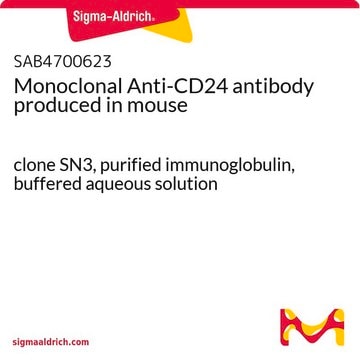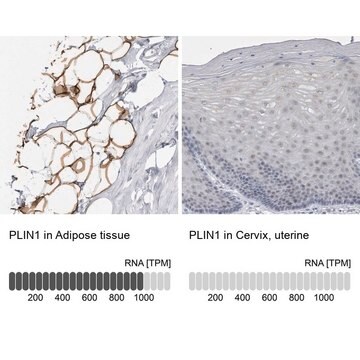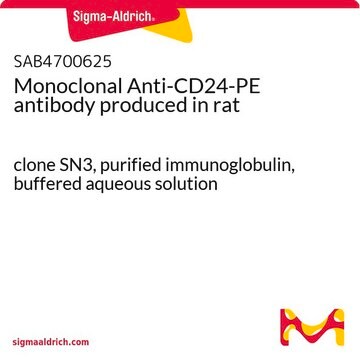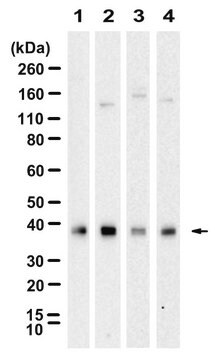CBL561
Anti-CD24 Antibody, clone SN3
clone SN3, Chemicon®, from mouse
Sinônimo(s):
Heat Stable Antigen, HAS
About This Item
Produtos recomendados
fonte biológica
mouse
Nível de qualidade
forma do anticorpo
affinity purified immunoglobulin
tipo de produto de anticorpo
primary antibodies
clone
SN3, monoclonal
reatividade de espécies
human
fabricante/nome comercial
Chemicon®
técnica(s)
flow cytometry: suitable
immunohistochemistry: suitable
immunoprecipitation (IP): suitable
Isotipo
IgG1
nº de adesão NCBI
nº de adesão UniProt
Condições de expedição
dry ice
modificação pós-traducional do alvo
unmodified
Informações sobre genes
human ... CD24(100133941)
Especificidade
Imunogênio
Aplicação
Flow Cytometry: 1:50 - 1:100 per 10e6 cells in 100 μL final volume.
Optimal working dilutions must be determined by the end user.
Inflammation & Immunology
Immunoglobulins & Immunology
forma física
Armazenamento e estabilidade
Outras notas
Informações legais
Exoneração de responsabilidade
Não está encontrando o produto certo?
Experimente o nosso Ferramenta de seleção de produtos.
Código de classe de armazenamento
12 - Non Combustible Liquids
Classe de risco de água (WGK)
WGK 2
Ponto de fulgor (°F)
Not applicable
Ponto de fulgor (°C)
Not applicable
Certificados de análise (COA)
Busque Certificados de análise (COA) digitando o Número do Lote do produto. Os números de lote e remessa podem ser encontrados no rótulo de um produto após a palavra “Lot” ou “Batch”.
Já possui este produto?
Encontre a documentação dos produtos que você adquiriu recentemente na biblioteca de documentos.
Active Filters
Nossa equipe de cientistas tem experiência em todas as áreas de pesquisa, incluindo Life Sciences, ciência de materiais, síntese química, cromatografia, química analítica e muitas outras.
Entre em contato com a assistência técnica








